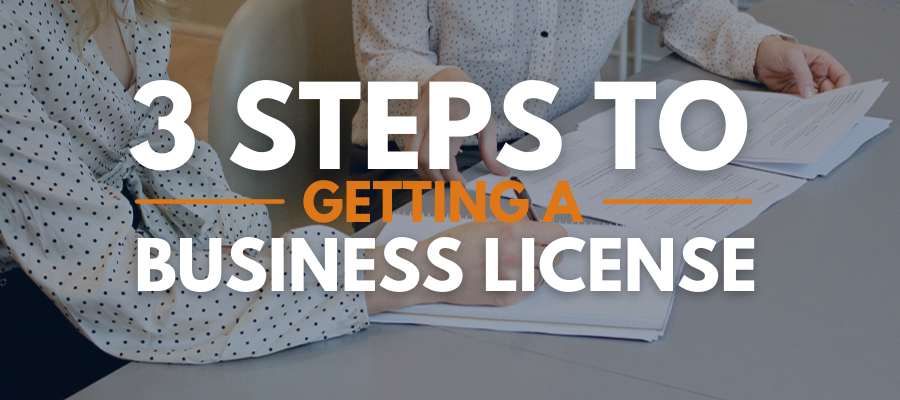
By Karen Edwards, Ph.D.
This blog post does not constitute and is not a substitute for professional legal advice.
Do you have a great idea for a business? Do you know how to get a business license? The pandemic has changed the way many businesses operate. From new business models to creative ways to collaborate, there has never been a more exciting time for those interested in starting a business! This blog post will show you why business licenses are important and how to obtain a license in 3 steps.
1. Determine what kind of business you are starting.
In order to determine what kind of business is best for you, it helps to have a clear picture of your business goals and ownership. There are several types of business structures including,
- sole proprietorship
- partnership
- corporation
- limited liability company (LLC)
- non-profit
Don’t jump into a quick decision! Your business structure will determine aspects of your daily operations, personal liability, filing requirements. The Small Business Association (SBA) recommends,
“Choose carefully. While you may convert to a different business structure in the future, there may be restrictions based on your location. This could also result in tax consequences and unintended dissolution, among other complications. Consulting with business counselors, attorneys, and accountants can prove helpful.”1
There are many free resources that can help you navigate this step, including SBA consultants, online articles, and virtual workshops.
Determine your business name
The next part of this step is to determine your business name. Once you have a few ideas, you’ll need to check the internet to see if the name is available.
First, be sure to check if the name is trademarked or service marked by searching the US Patent and Trademark Office’s website. In order to reserve the name, you’ll need to head to the Secretary of State’s website, in your state, to see if that name is available. In California, “when determining name availability, names are checked only against names of like entities registered with the California Secretary of State (e.g., a proposed corporation name is checked for availability only against other corporation names).”2
If your business name is free, you can send in a reservation for your state. California’s Name Reservation Request Form is linked here. Be sure to know the name restrictions and guidelines in your state. The Secretary of State office usually publishes and updates this information on their website.

2. Register your business.
This step is an easy one!
Once you’ve determined your business structure and a name for your business, you’re ready to register the business with your state. Check your state’s website to help you navigate this step. Several states have comprehensive guides online. For example, California’s Starting a Business website offers links to all the state forms you’ll need.
The fee for registering your business will be based on the type of business structure you are registering. This is also a great time to also apply for an Employer ID Number (EIN) which you will use for federal taxes, as well as payroll. An EIN is a number that will identify your business which is different from your social security number. More information on EINs are available here.
3. Apply for license and permits.
For this final step, you’ll need to research local and state requirements. Depending on your type of business, it is likely you’ll need a license or permit to operate. Licenses and permits include everything from home occupation permits, zoning clearances, to fire prevention inspection certificates. Many states have a website to guide you through this process. In California, the Department of Consumer Affairs has all the information you’ll need about the types of businesses that require licenses and permits.
According to their website, “The Department of Consumer Affairs (DCA) administers more than 3.9 million licenses in more than 280 license types including certificates, registrations and permits, from architects to accountants, dentists to veterinarians.”3
If you’re starting a business in California, check the Licensee List for information on the types of professional licenses that are necessary for different industries. You should also consult with a business accountant and/or attorney, since you will encounter tax fees upon registering your business.

Where to go for assistance?
If you are ready to start a business, but aren’t sure about this process or can’t afford to submit the business license fees, there’s help!
Although the pandemic has hit businesses hard, new businesses will play an important role in our recovery! Our partners at So Cal Innovation Station just received a grant for students who want a business license but cannot afford one. We will begin offering the opportunity to our students as soon as SCIS has received its requirements and guidelines.
In addition, be sure to check out the free resources online through the Small Business Association, SCORE, as well as other local non-profits.
Excited to start the journey to owning your own business? Come to Laurus College’s Entrepreneur’s Club meetings to hear from successful business owners, including alumni!
[author_bio]
References
1 Small Business Association, Choose a Business Structure, https://www.sba.gov/business-guide/launch-your-business/choose-business-structure, Accessed 11 August 2021.
2 California Secretary of State, Name Reservations, https://www.sos.ca.gov/business-programs/business-entities/name-reservations, Accessed 16 August 2021
3 Department of Consumer Affairs, Welcome Page, https://www.dca.ca.gov/, Accessed 16 August 2021.
